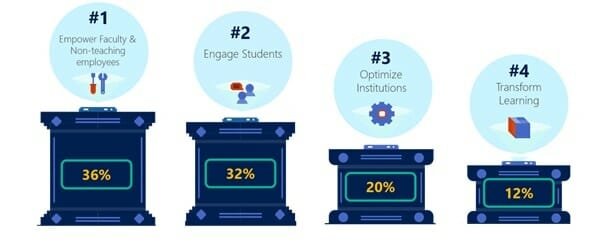According to the Microsoft Asia Digital Transformation Survey, 87% of leaders in the education sector around Asia Pacific are shifting their focus on embracing the Fourth Industrial Revolution for future growth and prepare a future-ready workforce. However, the survey also showed that only 23% of them possesses a full digital strategy in place.
The survey involved a total of 1,494 business leaders from Asia Pacific working in organisations with more than 250 employees from 13 markets, including 265 respondents from higher education institutions and universities.
Currently, the study showed that the transformation journey for most educational institutions in Asia is still at its infancy. Don Carlson, Director, Education, Microsoft Asia Pacific said: “Digital disruption has resulted in a shift in how work is being approached and conducted, and it is important that education institutions transform in order to equip students with future-ready skills.”
“At Microsoft, we have a specific and nuanced approach to digital transformation in education. We believe this involves transformation in four key pillars: empowering faculty and non-teaching employees, engaging students, optimising institutions and transforming learning, with data and the cloud being the key enablers.”
Engaging students
Education institutions need to adopt digital, interactive and personalised content to engage students. They must also prepare students with skills to succeed in the future, especially with computational thinking and creativity skillsets are highly sought after.
Empowering faculty and non-teaching employees
With the right technology, educators can access the best tools to engage students in and out of the classroom. Non-teaching employees can also meet compliance requirements to deliver exceptional student experiences.
Optimise institutions
Vast stores of data generated across faculties and educational institutions can gain insights into student performance and institutional efficiency with analytics. Real-time intelligence also allows them to meet transparency expectations and regulatory requirements.
Transform learning
Access to technology tools will allow educators to drive new research with agile, highly-automated digital processes.
Don Carlson, Director or Education, Microsoft Asia Pacific states: “Student insights are the new currency for education institutions, and 76% of education leaders agreed that new data insights would lead to new curriculums and learning outcomes. There is a need to rethink how leaders can better capitalize the value of latent data and embrace a different way of bringing together people, data and processes for their digital transformation success.”
With this in mind, education leaders in Asia Pacific are planning to explore a range of emerging technologies to accelerate and achieve digital transformation. Some of the technologies that are identified to be relevant to them are artificial intelligence (AI), Internet of Things (IoT), mixed reality, quantum computing and wearable technologies.










